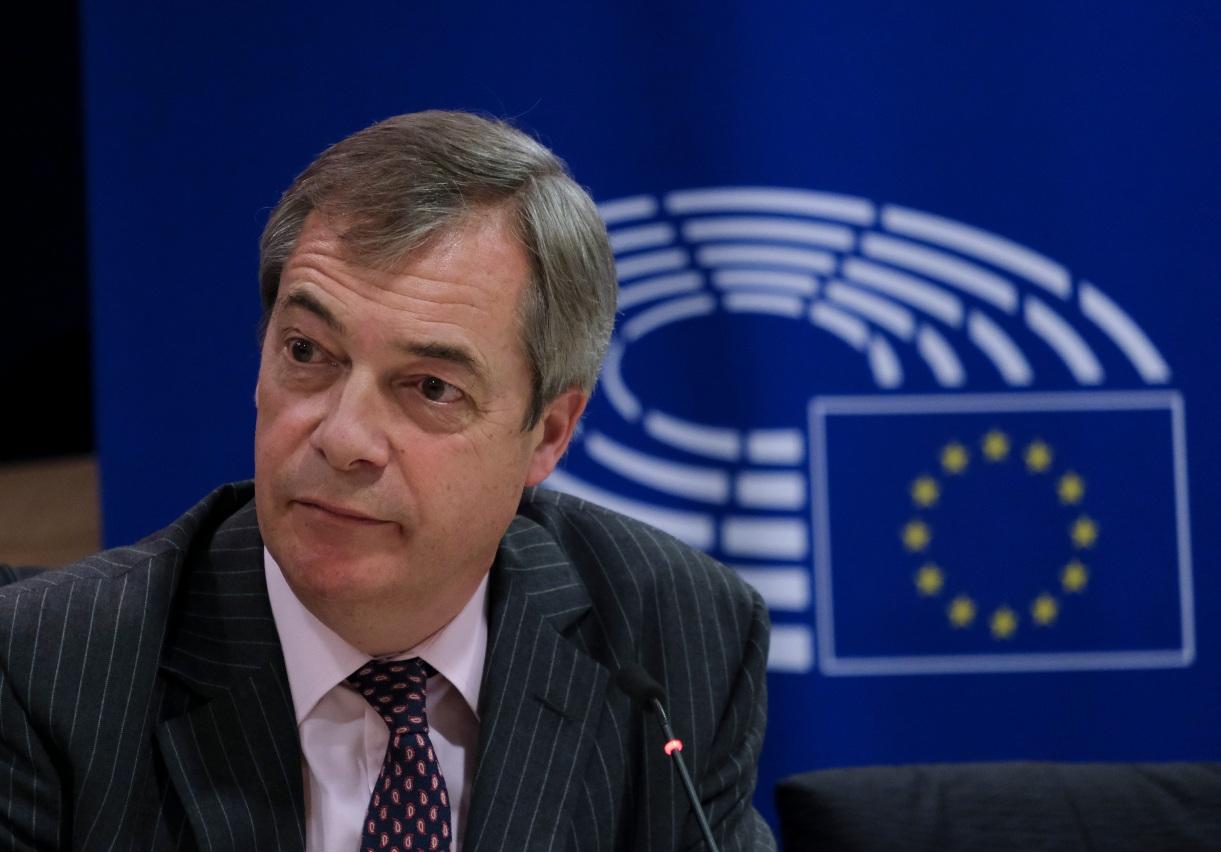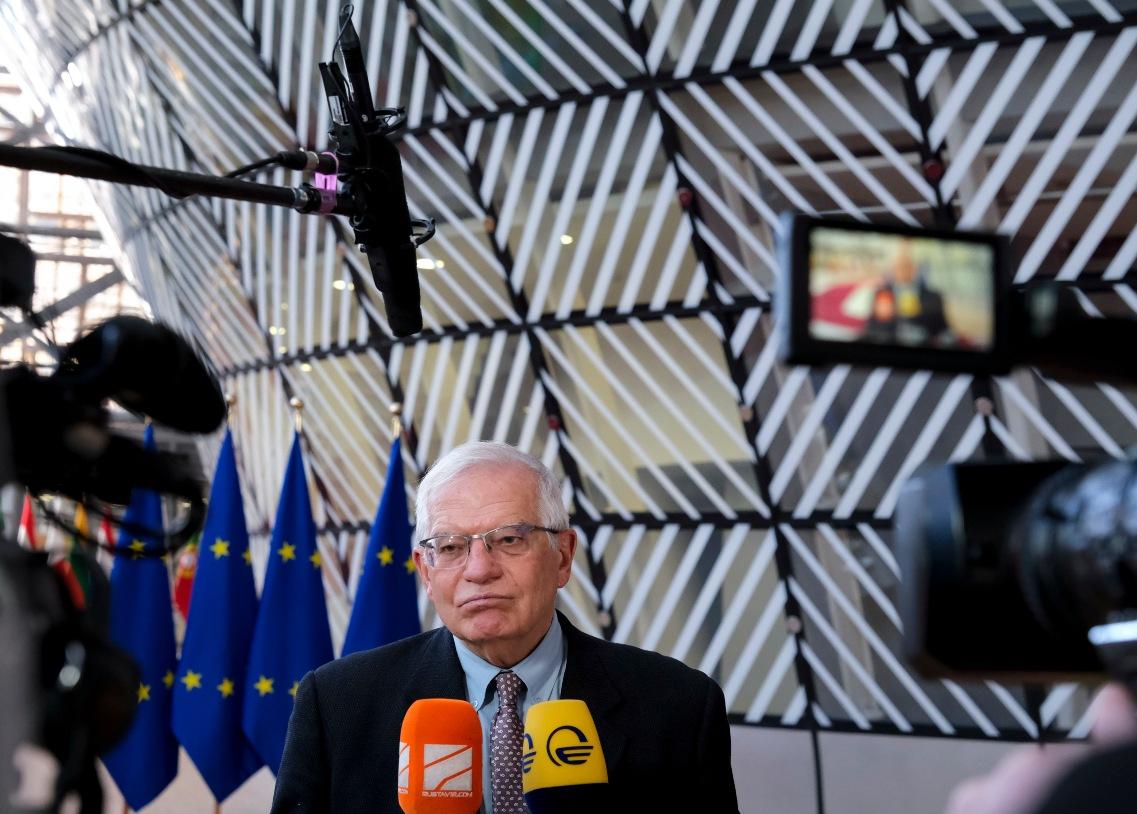Taxpayers risk paying for €300m black hole in luxury EU pension fund

Alexia Barakou
A voluntary top-up pension fund used by hundreds of politicians is set to go bankrupt by 2025 at the latest. The European Parliament must now decide what happens next.
“We love Europe, we just hate the European Union,” said Nigel Farage, Ukip party leader and Brexit architect, in his final speech to the European Parliament in 2020. Shortly after, he left the institution that had employed him for decades. However, his political struggle to separate the UK from the EU doesn’t extend to his own personal EU benefits.
As a former member of the European Parliament (MEP), he at one point joined a top-up pension scheme, mainly financed by EU taxpayers. If he joined the fund from the start, he will, in six years, after his 65th birthday, not only draw a regular pension from the parliament of approximately €6900 a month, but a further €6800 in the top-up pension – giving him €13,700 a month, for the rest of his life.
This plush pension fund will run out of money by 2025 at the latest. The looming bankruptcy comes at the worst possible time for the European Parliament. Since last December, it is engulfed in a major corruption scandal, in which Morocco and Qatar are suspected to have bribed MEPs in order to influence EU decisions. The parliament’s reputation is severely damaged, just one year before elections will be held across Europe.
Farage’s French anti-EU ally, far-right politician Marine Le Pen, is also in the fund. So are several people holding EU top jobs today, like EU’s foreign chief Josep Borrell, agriculture commissioner Janusz Wojciechowski and cohesion commissioner Elisa Ferreira. All five were contacted by Investigate Europe but refused to comment.
Official figures filed by the fund to the Luxembourg register attest of 660 members (view full list). But in an April note from the European Parliament General Secretary, the number is 914. And sources with insight put the most current figure at 908. The European Parliament refused to provide the 908 names, citing personal data reasons.
According to sources, 21 current MEPs are among the 908 beneficiaries. IE reached out to all 21 for comment – only one replied.
As a former member of the European Parliament (MEP), he at one point joined a top-up pension scheme, mainly financed by EU taxpayers. If he joined the fund from the start, he will, in six years, after his 65th birthday, not only draw a regular pension from the parliament of approximately €6900 a month, but a further €6800 in the top-up pension – giving him €13,700 a month, for the rest of his life.
This plush pension fund will run out of money by 2025 at the latest. The looming bankruptcy comes at the worst possible time for the European Parliament. Since last December, it is engulfed in a major corruption scandal, in which Morocco and Qatar are suspected to have bribed MEPs in order to influence EU decisions. The parliament’s reputation is severely damaged, just one year before elections will be held across Europe.
Farage’s French anti-EU ally, far-right politician Marine Le Pen, is also in the fund. So are several people holding EU top jobs today, like EU’s foreign chief Josep Borrell, agriculture commissioner Janusz Wojciechowski and cohesion commissioner Elisa Ferreira. All five were contacted by Investigate Europe but refused to comment.
Official figures filed by the fund to the Luxembourg register attest of 660 members (view full list). But in an April note from the European Parliament General Secretary, the number is 914. And sources with insight put the most current figure at 908. The European Parliament refused to provide the 908 names, citing personal data reasons.
According to sources, 21 current MEPs are among the 908 beneficiaries. IE reached out to all 21 for comment – only one replied.

Nigel Farage, pictured here at a Brussels press conference, is among around 900 current or former politicians believed to have benefited from the fund.Shutterstock
‘A form of theft’
The voluntary pension fund was set up in 1991 as a private company under Luxembourg law, with the intention to level the pensions for all MEPs, some of whom at the time had little ordinary pension entitlements under their national rules. When a common pension for all MEPs was put in place in 2009, the voluntary fund was closed for new members.Even though the intentions might have been good, the private pension fund was from the beginning financially unsustainable. “With almost criminal strength, a system was created that was doomed to fail from the start,” says Daniel Freund, a German Green MEP in the budget control committee.
Ingeborg Gräßle, a German conservative and former president of the same committee, takes a similar view: “These pension payments from the extra fund are a form of theft that is truly scandalous.”
Bailout or not?
On Monday 17 April, the Bureau, the parliament’s internal body made up of 20 high ranking MEPs, had a first round of discussion about how to cover the deficit, calculated to “€308 – 313 million”. According to a note from the meeting, there are three options.The first would mean that the European Parliament takes over all the fund’s pension obligations, a full-blown bailout with public money. The second would mean the pensioners take the hardest hit, dividing the existing assets among the members for a one-off, final payment. The third option, which the Bureau decided to examine further, would mean a cut in pensions payouts, most likely combined with a smaller bailout.
Should the bailout be paid using the EU budget, the burden would fall on taxpayers across Europe. Assuming a maximum bailout of €313 million, this would hit German taxpayers with approximately €74 million and French with €58 million, applying the share of national contributions to the 2023 EU budget.
A possible bailout would add to the public money already paid into the private fund. For every one euro that individual MEPs contributed, the parliament paid two euros from its budget. Between 1991 and 2009, the parliament’s contribution added up to roughly €118 million, according to a source familiar with the matter. The European Ombudsman launched an investigation earlier this year into the parliament’s refusal to confirm and publish the numbers.
In fact, even MEPs individual contributions to the fund can be questioned. Until 2008, they were automatically deducted from the MEP’s general allowance, which is a monthly lump-sum supposed to cover MEP’s office expenses, not a salary.
Typically, Europeans get 60 to 70 per cent of their salary in pension before taxes. MEPs only had to contribute to the fund for five years, and later only two years, to receive an extra-pension for life. The acquired entitlements were so large, that the total contributions for an individual MEP sitting for one term would be paid back within four years of retirement. As most former MEPs drew a pension from the fund for a longer period than that, the deficit naturally increased.
For at least 20 years, the voluntary pension fund has run a so-called actuarial deficit, meaning that the estimated future pension pay-outs have been greater than the fund’s estimated assets.
A possible bailout would add to the public money already paid into the private fund. For every one euro that individual MEPs contributed, the parliament paid two euros from its budget. Between 1991 and 2009, the parliament’s contribution added up to roughly €118 million, according to a source familiar with the matter. The European Ombudsman launched an investigation earlier this year into the parliament’s refusal to confirm and publish the numbers.
In fact, even MEPs individual contributions to the fund can be questioned. Until 2008, they were automatically deducted from the MEP’s general allowance, which is a monthly lump-sum supposed to cover MEP’s office expenses, not a salary.
Extremely generous terms
The payouts from the fund is nothing to sneeze at. The average pension payout from the fund in 2022 was €2206 a month, but the payouts can be much higher. IE’s calculations show that MEPs who contributed to the fund for the maximum 19-year period, would, in 2022, receive an additional pension of €6800 per month. Combined with their general, old-age pension of €6900 per month, it is almost €14,000 every month, well above their previous salary.Typically, Europeans get 60 to 70 per cent of their salary in pension before taxes. MEPs only had to contribute to the fund for five years, and later only two years, to receive an extra-pension for life. The acquired entitlements were so large, that the total contributions for an individual MEP sitting for one term would be paid back within four years of retirement. As most former MEPs drew a pension from the fund for a longer period than that, the deficit naturally increased.
For at least 20 years, the voluntary pension fund has run a so-called actuarial deficit, meaning that the estimated future pension pay-outs have been greater than the fund’s estimated assets.

The EU’s foreign chief Josep Borrell is a member of the voluntary pension fund.Shutterstock
In 2004, the Bureau decided to triple the contributions to the fund, which again were paid in two thirds from the EU budget. This would have solved the financial problems in the long run, a source familiar with the management of the fund says.
However, in 2009, new members could no longer join the fund and these higher contributions were only paid until July 2009. At the same time, the European Parliament decided that the pensioners rights should be “fully maintained” in the future. “The decision to stop the contributions but stick fully to the original entitlements was irresponsible and the deficit was unavoidable,” says the person, who has internal knowledge about the funds development.
”I think it was in 2003 when I was the rapporteur for the budget discharge, that I discovered the problems with the fund,” he says. “So we started raising questions, to the Secretary General, to the Bureau, and we voted on a resolution, several times actually, where we said that taxpayers should not be responsible for the deficit. Years on, we saw the deficit become larger and larger.”
A cross-party coalition of MEPs in the committee, including Green MEP Staes and conservative Ingeborg Gräßle, criticised how the fund was handled.
“There was no party-politics in this, we all believed that it was unacceptable and that ultimately taxpayers should not have to pay for it. We managed to get the plenary to see the problems. But we never managed to force the leadership of the parliament to listen,” says Staes.
He says there was a slight pressure from the parliament administration on new MEPs to join the fund. Some did without thinking, he says. Others were just greedy. “They already have a nice income and a nice pension, which is larger than what average people have.”
However, in 2009, new members could no longer join the fund and these higher contributions were only paid until July 2009. At the same time, the European Parliament decided that the pensioners rights should be “fully maintained” in the future. “The decision to stop the contributions but stick fully to the original entitlements was irresponsible and the deficit was unavoidable,” says the person, who has internal knowledge about the funds development.
Turning a blind eye
The looming bankruptcy of the pension fund shouldn’t come as a surprise. Bart Staes, a Belgian ex-MEP who for 20 years was a member of the budget control committee, says that the risks were known early on.”I think it was in 2003 when I was the rapporteur for the budget discharge, that I discovered the problems with the fund,” he says. “So we started raising questions, to the Secretary General, to the Bureau, and we voted on a resolution, several times actually, where we said that taxpayers should not be responsible for the deficit. Years on, we saw the deficit become larger and larger.”
A cross-party coalition of MEPs in the committee, including Green MEP Staes and conservative Ingeborg Gräßle, criticised how the fund was handled.
“There was no party-politics in this, we all believed that it was unacceptable and that ultimately taxpayers should not have to pay for it. We managed to get the plenary to see the problems. But we never managed to force the leadership of the parliament to listen,” says Staes.
He says there was a slight pressure from the parliament administration on new MEPs to join the fund. Some did without thinking, he says. Others were just greedy. “They already have a nice income and a nice pension, which is larger than what average people have.”
When the deficit became wider known and the fund publicly criticiszed, many MEPs quit the scheme. Some political groups and some national party delegations left the fund on principle.
On several occasions, MEPs have indicated their formal refusal to use the European Parliament’s budget to bail out the fund. As of 2011, in a resolution adopted in plenary, the EP “takes the view that this deficit should not be paid with taxpayers’ money, but by the Fund itself”. This position was reiterated in resolutions adopted by the plenary on multiple occasions, most recently in 2016.
It was only in 2009 that the Bureau decided that the European Parliament would in fact guarantee future pensions “after exhaustion of the Pension Fund”.
Among the 20 Bureau members who took the vote, 15 either were or had at some point been beneficiaries of the fund. No-one abstained over conflict of interest, according to the minutes from the meeting.
Only one Bureau member objected: the Dutch liberal MEP Jan Mulder, himself not a beneficiary. Mulder was also a member of the budget control committee and together with Ingeborg Gräßle and Bart Staes formed the trio who were the main critics of the fund.
The upcoming decisions on how to finally resolve the fund’s deficit before its bankruptcy will again be taken by the Bureau. Among the 20 members, three are still beneficiaries of the fund, according to an internal list from 2022: Dimitrios Papadimoulis, MEP from the Greek radical left, Latvian national-conservative MEP Roberts Zile and Austrian conservative Othmar Karas. Zile and Karas, who both declined to comment, also sit on the management board of the private pension fund.
The Green MEP Freund considers this situation unacceptable. The three MEPs are “in a massive conflict of interest, when they help decide whether the fund will receive even more tax money”, he says. “Decency would demand that they leave this fund immediately.”
When approached for comment, Papadimoulis said on 2 May that he plans to leave the fund: “In light of the decisions that need to be taken on this issue by the EP bureau, I would like to be absolutely clear that I will not make use of the retirement rights afforded by this fund.”
The pressing issue for the Bureau is determining whether or not the European Parliament is legally obliged to honour the promises to the former MEPs. The parliament’s own rules say so. Recent EU case law says otherwise.
The Bureau has twice before modified the terms of the pension fund, to increase its sustainability. In 2009, the retirement age was raised from 60 to 63 and the option for early retirement was closed. Nine years later, the retirement age was again raised, to 65, and a levy of five per cent on pension payouts was introduced.
Both decisions were appealed in the European Court of Justice by some of the beneficiaries of the pension scheme. On both occasions, the plaintiffs lost. The Bureau could – and can – change the terms of pension payouts, according to the EU court.
In the coming months, the Bureau will have to decide whether or not to use more taxpayer money to bailout the plush pensions of Le Pen, Farage and Borrell. If it chooses not to, a pension cut will most likely land the issue again in the EU court.
Editors: Elisa Simantke & Chris Matthews Graphs: Marta Portocarrero
This story has been published with our media partners Tagesspiegel, Mediapart, Le Soir, InfoLibre, Publico and Dagens Nyheter. A previous version of this article has been corrected with the exact wording of Nigel Farage’s quote.
On several occasions, MEPs have indicated their formal refusal to use the European Parliament’s budget to bail out the fund. As of 2011, in a resolution adopted in plenary, the EP “takes the view that this deficit should not be paid with taxpayers’ money, but by the Fund itself”. This position was reiterated in resolutions adopted by the plenary on multiple occasions, most recently in 2016.
Conflict of interest
When the voluntary private pension fund was created, it wasn’t clear from the outset who was carrying the risk of the fund’s investments: EU taxpayers or the members themselves? The court of auditors as well as the parliament’s budget control committee repeatedly pressured the Bureau to define the liabilities in case of a future deficit.It was only in 2009 that the Bureau decided that the European Parliament would in fact guarantee future pensions “after exhaustion of the Pension Fund”.
Among the 20 Bureau members who took the vote, 15 either were or had at some point been beneficiaries of the fund. No-one abstained over conflict of interest, according to the minutes from the meeting.
Only one Bureau member objected: the Dutch liberal MEP Jan Mulder, himself not a beneficiary. Mulder was also a member of the budget control committee and together with Ingeborg Gräßle and Bart Staes formed the trio who were the main critics of the fund.
The upcoming decisions on how to finally resolve the fund’s deficit before its bankruptcy will again be taken by the Bureau. Among the 20 members, three are still beneficiaries of the fund, according to an internal list from 2022: Dimitrios Papadimoulis, MEP from the Greek radical left, Latvian national-conservative MEP Roberts Zile and Austrian conservative Othmar Karas. Zile and Karas, who both declined to comment, also sit on the management board of the private pension fund.
The Green MEP Freund considers this situation unacceptable. The three MEPs are “in a massive conflict of interest, when they help decide whether the fund will receive even more tax money”, he says. “Decency would demand that they leave this fund immediately.”
When approached for comment, Papadimoulis said on 2 May that he plans to leave the fund: “In light of the decisions that need to be taken on this issue by the EP bureau, I would like to be absolutely clear that I will not make use of the retirement rights afforded by this fund.”
The pressing issue for the Bureau is determining whether or not the European Parliament is legally obliged to honour the promises to the former MEPs. The parliament’s own rules say so. Recent EU case law says otherwise.
The Bureau has twice before modified the terms of the pension fund, to increase its sustainability. In 2009, the retirement age was raised from 60 to 63 and the option for early retirement was closed. Nine years later, the retirement age was again raised, to 65, and a levy of five per cent on pension payouts was introduced.
Both decisions were appealed in the European Court of Justice by some of the beneficiaries of the pension scheme. On both occasions, the plaintiffs lost. The Bureau could – and can – change the terms of pension payouts, according to the EU court.
In the coming months, the Bureau will have to decide whether or not to use more taxpayer money to bailout the plush pensions of Le Pen, Farage and Borrell. If it chooses not to, a pension cut will most likely land the issue again in the EU court.
Editors: Elisa Simantke & Chris Matthews Graphs: Marta Portocarrero
This story has been published with our media partners Tagesspiegel, Mediapart, Le Soir, InfoLibre, Publico and Dagens Nyheter. A previous version of this article has been corrected with the exact wording of Nigel Farage’s quote.





